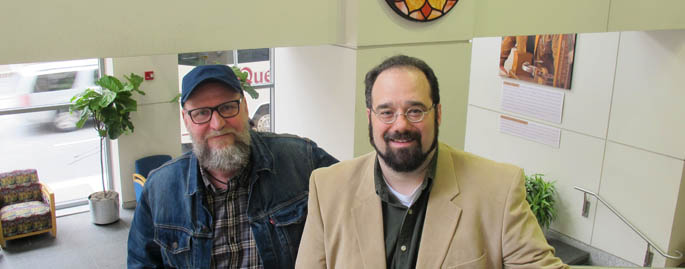Professors Present on Hermeneutics of Love at Psychology Conference Monday, March 25, 2013

Pictured: Robert McInerney, Ph.D. and Brent Robbins, Ph.D.
Associate Psychology Professors Robert McInerney, Ph.D. and Brent Robbins, Ph.D. recently presented on the "hermeneutics of love" at the American Psychology Association's Division 32 Annual Conference at Pacifica Graduate Institute in Santa Barbara, Calif.
McInerney and Robbins presented their ideas on the interpretation, or hermeneutics, of love as a potential new philosophical and theoretical foundation for clinical-community psychology. In addition, the professors were asked to submit their individual papers on the topic for an upcoming edition of The Journal of Humanistic Psychology.
Titled "A Hermeneutics of Love for Community Research: Suffering and Acting on Trembling Ground," McInerney's paper addressed the possibility of a radical empathy for others.
"As community researchers, we may lovingly suffer with others, even others we feel are in some sense unknowable, strange and unlovable," remarked McInerney.
Robbins' paper "The Problem of Human Dignity at the Heart of Humanistic Psychology: Retrieving Existential Personalism and a Hermeneutics of Love within the Humanistic Tradition," described how humanistic psychology is different from other approaches to psychology because it uses a hermeneutics of love.
"The idea is that if I want to know the truth about who someone really is, the best access to that truth is through an attitude of agape love - a willing of the good of the other for that person's own sake rather than for my own gain," explained Robbins.
"Overall, we believe that to interpret others this must include a love of others. By love we mean selfless, agape love. In essence, this is a love that is impossible and never complete but nevertheless continually attempted," said McInerney.
Learn more
Read about Point Park University's bachelor's degree in psychology and master's degree in clinical-community psychology.

